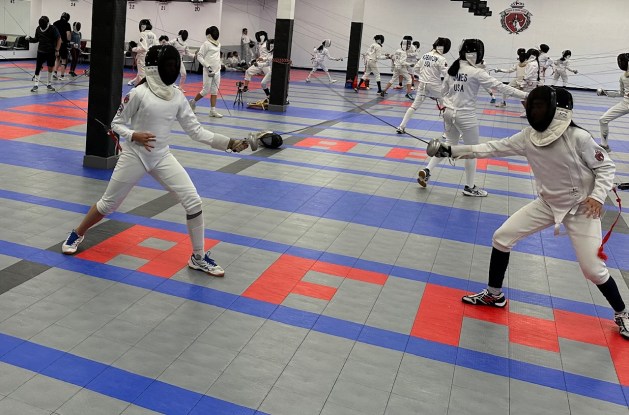
What are the things that make life really rich and meaningful? When you think about your own childhood, you probably don’t remember the things you did so much as the people you did them with. Your best friend who sat next to you in math class and made you laugh every day, or the kid on the playground who you lobbed pinecones at during recess, and all other meaningful friendships you had back then.
Though we put a lot of emphasis on what it means to be a great fencer, where kids end up getting a lot of what matters in this sport is through the close friendships they forge with one another. This doesn’t just happen by magic – it’s grounded in the shared experiences that they have with one another and the ways that those experiences knit them together.
This is important for kids. Today more than ever, kids are disconnected from one another thanks to technology and the increasing ways that we’re spread out. In the wake of the pandemic, which will have repercussions for many years in terms of childhood socialization according to experts, kids have to figure out again how to build relationships with each other, and that’s no easy thing.
Fencing can do that in remarkable ways. Let’s explore how.
1. Common Passion and Shared Goals
I love fencing, you love fencing. We both love fencing and it’s something that we can share.
Look back to when you were a kid. What were you into? Baseball cards? Comic books? Soccer? Horses? One of the hallmarks of being a kid is how you dive into interests and then connect with your friends to get the joy of the community from those shared interests. You would sit together at lunch and talk endlessly about the newest Pokemon or how to solve a Rubik’s cube.
What’s different about fencing is that, while lots of interests foster shared love of something, fencing adds in shared goals. Fencers share a love for the game AND a commitment to improving their skills. This shared interest provides a strong foundation for building connections because kids can relate to and support each other in their fencing journey.
This is where deep and meaningful relationships are built. It’s in the time spent exploring the love of something and then growing together. It makes the hard times easier and the great times even better.
2. Teamwork and Collaboration
While fencing is primarily an individual sport where athletes compete for themselves, the essence of teamwork and collaboration is deeply woven into its fabric. Fencers train together because solitary training is impractical; teammates and sparring partners become indispensable. In this shared pursuit of excellence, individual successes resonate as collective victories, and mutual growth becomes the norm. Each fencer contributes to the other’s progress, creating a supportive and unified training environment.
Competitions may be individual battles, but the bond formed through training together carries into the tournament arena. Fencers, though fencing for personal achievement, also represent their club and teammates. The sidelines echo with cheers and support from fellow fencers, transforming individual efforts into a shared experience.
While team competitions are not as prevalent in the USA, the educational value they offer is undeniable. Clubs that incorporate team events into their training programs provide a platform for fencers to learn strategic and tactical collaboration and strengthen their sense of camaraderie. It’s an aspect of growth that enhances the overall fencing experience for young athletes.
Beyond formal team structures, the communal spirit extends to various club activities, such as parties, excursions, parades, events, and demonstrations. These shared experiences foster a sense of community that goes beyond the confines of fencing bouts, building trust, empathy, and enduring friendships among youth fencers.
3. Shared Challenges and Triumphs
One of the toughest things about fencing is leveling up your skills. It’s not a straight line to go from novice fencer to competitive champion, and there are plenty of places where challenges arise, both physical and mental.
The process of learning and mastering fencing techniques can be tough, but overcoming these obstacles can be incredibly rewarding. Kids who face and conquer challenges together form strong bonds as they share in each other’s triumphs. Most of this happens right in the club, where classes and open bouting put kids in a collective situation of growth. This isn’t competition, and if you go into a fencing club you’ll hear fencers giving each other tips and support as they learn through trial and error.
- “Try lowering your blade a little when you go for the touch.”
- “You’re keeping your back leg really long, maybe shorten your stance so you can go faster.”
- “You almost had me there, that was a good move.”
This is the kind of banter we hear in youth fencing training sessions all the time. Whether it’s landing a perfect touch during a class, pushing through a tough match in competition with your fellow fencers at the sidelines, or overcoming a fear of losing , these shared experiences create a special connection among young fencers.
In fencing, kids experience both victories and defeats at the macro level in terms of competitions but at the micro level in terms of individual points. There’s the chance to connect with and support each other at a wide range of moments, and it’s that kind of thing that fuels fencing friendships. The beauty of fencing friendship lies in the way even youth fencers lift each other up as they navigate winning and losing – regardless of the outcome.
4. Travel and Tournaments
Youth fencing often involves regional and national tournaments, where fencers from different clubs and regions come together to compete. These events offer kids the chance to meet and interact with fencers from diverse backgrounds.
Traveling to tournaments and spending time together outside of regular training builds friendships that extend beyond the confines of the fencing club. It’s an opportunity for shared experiences that cement connections in a way that nothing else does. Being together outside of normal training time is incredibly important for fencers of all ages.
The unstructured time between bouts is a valuable point of camaraderie building for kids. They sit together and talk, watch other fencers, go grab a bite of food or explore the venue. It’s an intangible kind of time to spend together, and it’s the kind of thing that most of us as parents remember doing with our peers as young people.
Though travel and tournaments definitely exist to give fencers a chance to expand their skills, but they also offer an incredible place for youth athletes to create lasting relationships.
Beyond the strip
Youth fencing offers far more than just physical activity and competitive opportunities. It provides kids with a platform to build deep and meaningful friendships. Through shared passions, teamwork, overcoming challenges, and supporting one another, young fencers forge connections that can last a lifetime. The fencing community becomes a place of belonging and understanding, where kids not only learn the art of fencing but also the art of forming genuine and lasting friendships.
We’ve increasingly seen kids struggle with connection in the wake of the pandemic and as digital interactions take over real world connections. Spending time with other kids their age while they work together through fencing is one way to bolster the relationships that kids need for a strong sense of community. We need relationships to help us grow!
Youth fencing gives kids a place not only to gain valuable skills on the piste but also forge friendships that will enrich their lives for years to come.




For vet fencers as well. We have pre-NAC “get-togethers” that are either formal events or just an afternoon’s structured sparring followed by pizza and beer. Some of our “friendly-competitors” relationships span decades.